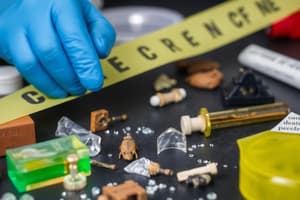Podcast
Questions and Answers
What type of evidence comes from one source?
What type of evidence comes from one source?
- Trace Evidence
- Individual Evidence (correct)
- Physical Evidence
- Class Evidence
What is Class Evidence?
What is Class Evidence?
Objects that can be classified into groups.
What is Trace Evidence?
What is Trace Evidence?
Evidence found in small minute amounts.
What is Physical Evidence?
What is Physical Evidence?
What is Testimonial Evidence?
What is Testimonial Evidence?
What does Indirect Evidence mean?
What does Indirect Evidence mean?
Define Circumstantial Evidence.
Define Circumstantial Evidence.
What are the two classes of evidence?
What are the two classes of evidence?
What is Prima Facie Evidence?
What is Prima Facie Evidence?
What is Direct Evidence?
What is Direct Evidence?
What is Transient Evidence?
What is Transient Evidence?
What does DNA represent in the context of evidence?
What does DNA represent in the context of evidence?
Flashcards are hidden until you start studying
Study Notes
Types of Evidence Overview
- Individual Evidence: Unique evidence originating from a single source, such as DNA, blood, or bite marks, providing strong links to specific individuals.
- Class Evidence: Evidence categorized into groups based on shared characteristics, like different brands of jeans (Levi, Wrangler, True Religion, Lee).
- Trace Evidence: Tiny amounts of evidence found at a crime scene, including dust, hair fragments, small blood droplets, or glass pieces.
Physical and Testimonial Evidence
- Physical Evidence: Tangible objects or materials connected to a crime, for example, tools like hammers, nails, and electronic devices.
- Testimonial Evidence: Information provided under oath by an eyewitness or a competent witness, enhancing the legal validity of testimonies.
Categories of Evidence
- Indirect Evidence: Evidence that does not directly prove a fact but can imply other conclusions, such as possession of drugs or DUI.
- Circumstantial Evidence: Evidence that suggests a fact through inference rather than direct observation, often needing further corroboration.
- Class of Evidence: Broad division of evidence into two primary categories: Physical and Testimonial.
Legal Terms Related to Evidence
- Prima Facie Evidence: A legal term indicating sufficient evidence to establish a fact unless disproven; synonymous with testimonial evidence.
- Direct Evidence: Known as testimonial evidence in English, it provides clear proof through direct observation or participation.
Nature of Temporary Evidence
- Transient Evidence: Evidence that is short-lived or temporary, requiring prompt collection to avoid loss, like certain physical traces.
Studying That Suits You
Use AI to generate personalized quizzes and flashcards to suit your learning preferences.



